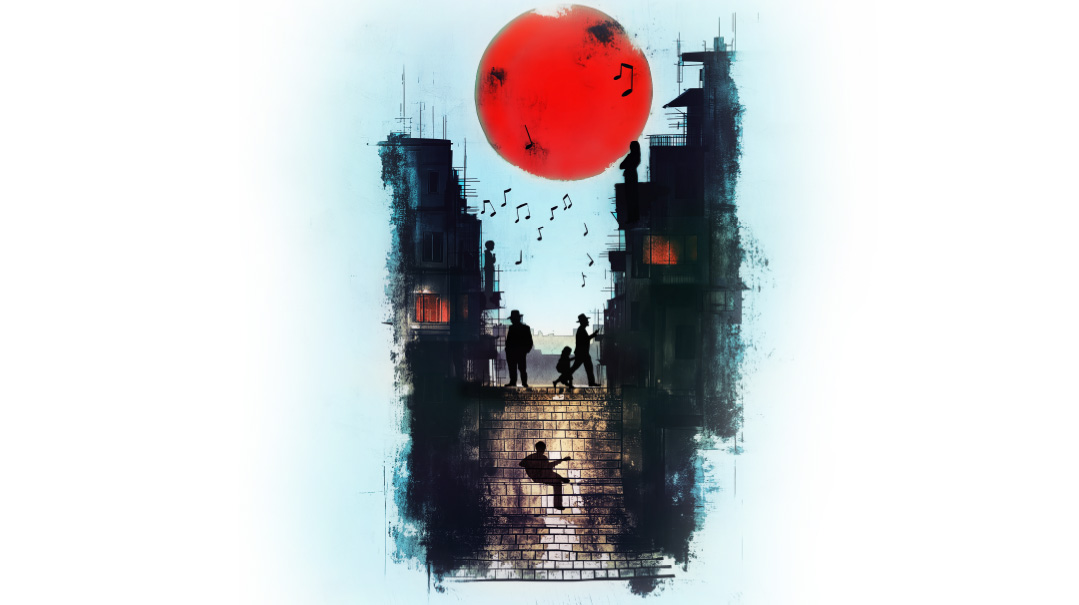Last Stop: Chapter 10
| April 25, 2023The trip had been the only thing in school this year that Yudi had spoken about with enthusiasm. Losing it must be crushing

“Morning,” Naftali greets Yudi as he climbs onto the bus. There is something odd about the way Yudi moves today; his walk across the lawn had been stilted, and now he clutches his knapsack to him.
Yesterday, he’d been furious. He hadn’t gone to class at all — that Naftali had seen. Instead, he’d stalked through the halls and out in the fields, his fists clenched and a pall of fury settled over his face. On the way home he hadn’t spoken, just sat behind Naftali with his eyes like embers.
Naftali knows how excited Yudi had been for the trip, how it had been the only thing in school this year that Yudi had spoken about with enthusiasm. Losing it must be crushing. Naftali had mentioned it to Chana, who had been more sanguine about it. It’ll feel like the end of the world for a few days, then he’ll move on. Kids are resilient. She’d looked up at him with a wry smirk. And it does sound like he needed a bit of a potch.
Maybe. But Chana doesn’t see what Naftali does: the empty house, the dull eyes, the way that Yudi has nothing and no one to lean on. Naftali’s always been a touch soft, and he’s sure that Yudi more than anyone needs a gentle approach.
Seeing how different he is today, though, he wonders if he’d misjudged Yudi’s despair. Yudi smiles at Naftali with strange serenity, and he says, “Morning, Naftali,” as though nothing had happened yesterday. He sits down in his seat, shifting his backpack and cradling it on his lap like a mother might hold a toddler.
It puts Naftali on edge. Yudi makes small talk with him as they drive, casual conversation with no hint of yesterday’s drama. “The snow looks like it’s melting,” he observes. “But it’s still pretty cold. Do you think it’ll turn to ice?”
“Hope not.” Naftali stops at a traffic light, glances uncertainly at Yudi in the mirror, then drives on. “It’s miserable to drive on the ice. I’m always worried about skidding.”
“Oh, yeah.” Yudi sounds worried. “Be careful out there.” He falls silent then for the rest of the ride, still holding his backpack tightly and waiting as other boys filter onto the bus. It makes Naftali uneasy, his silence as well as his last words. Be careful out there, like you might say to someone going off on a trip, or someone you won’t see for a while.
The thought crosses his mind, as he watches the boys get off the bus, that Yudi might be planning to run away. There’s something in the way he cradles his backpack that triggers Naftali’s suspicions, and he tracks Yudi’s walk into the school building with eagle eyes.
But Yudi goes inside. He doesn’t hesitate or drag his feet as he’s done in the past, and he doesn’t look back at Naftali.
Naftali puts aside his worry. What good will it do? Eliezer has made his position on Yudi clear, and Naftali can’t imagine going back to him after yesterday. The rift between them is growing with every interaction, each one digging a little deeper and hurting a little more.
Instead, he does his preschool route, then settles back down in his office to get some work done. The ArtScroll Gemara from yesterday still sits next to his computer, taunting him with its presence, and Naftali grimaces and tries again.
After a few minutes, his mind is drifting again, and he’s only made it through two more lines. The words are jumbled syllables, dancing around his mind, and each time he catches one, he loses the next. It’s too hard. It’s impossible.
His hand slams down on the desk with such frustrated force that he startles himself. He considers himself fairly even-tempered, but he feels angry and restless now, even worse than he had yesterday. It’s like he’s a teenager in school again, seething with pent-up despair toward learning and defiance against those who’d branded him a failure. He’d never acted out like Yudi, but he’d shut down, staring at the Gemara as though it were his foe.
He’s supposed to be past that. He’s doing this by his own choice. But he finds, with a growing sense of defeat, that he does not like the person he becomes when he’s trying to learn.
Blindly, he picks up his phone and calls Chana.
“Naftali?” she sounds concerned. “Is everything all right?”
“It’s fine,” he assures her. “Everything is fine. I’m sorry to bother you at work—”
“Eh, don’t worry about,” Chana says, and lowers her voice conspiratorially. “I was on a work call with that client from Louisville. He’s the worst. Wouldn’t stop talking about his pool. Have you ever noticed that people with pools find a way to slip it into every conversation? Oh, I don’t go to the gym, I just swim every morning. Hey, looks like rain, free water for the pool. I don’t see how the rising price of chlorine is really something to discuss with your accountant, especially when she has a busy morning. Anyway, what’s going on?”
Naftali can feel Chana’s presence in the room, her vibrant energy flitting around him until a reluctant smile is tugged onto his face, and he wants nothing more than to make her happy. “I’ve been trying to learn,” he blurts out. “I got a Gemara from the beis midrash, and I’ve been trying to learn.”
“Oh!” Chana says with startled delight. “That’s wonderful.”
Naftali rubs anxiously at the side of his beard. When he doesn’t say anything, Chana says, “How’s it going?”
“Not so wonderful,” Naftali says, and his voice is hoarse and heavy with dejection. “It’s still — I’m still me.”
“And baruch Hashem for that,” Chana says gently, though her happiness is more guarded, more muted now. “The first few times might not be easy, but I know it’ll get better. Maybe you can work out a chavrusa—”
“No!” Naftali says so quickly that Chana falls into silence. Naftali has to gather his composure again. “I don’t think I’m there,” he manages. And then he adds a “yet,” because he can handle many things, but he can’t handle disappointing Chana.
Chana exhales. “That’s fine,” she says. “Take your time.” She hesitates, then murmurs, “I’m so proud of you.”
Naftali can feel the unpleasant frustration rising again, simmering both inward and at Chana. When he hangs up, he stares at the Gemara again, takes a breath, and stands up. The room is beginning to close in on him, and he needs space.
He moves out into the hallway of interconnected offices and into the main mesivta office, where the secretary sits. To his chagrin, Yudi is standing in the office, his backpack still slung over his shoulder.
Yudi sees Naftali and shrugs, that smooth inscrutability still on his face. “I didn’t do anything,” he says. “The menahel just called me in out of nowhere.”
“Oh.” Naftali lingers in the office, an unpleasant sensation in the pit of his stomach. Something about Yudi is wrong today. “How are you feeling today? I know that yesterday was rough—”
Yudi’s face shifts for an instant, and Naftali catches a glimpse of something that makes his blood run cold: fury, unfettered and foul, twisting Yudi’s face into something unrecognizable. He’s stunned into silence.
Then Yudi’s face goes flat again, and he says, “I’m fine.”
He is not fine, though he might be doing his best to seem like it. Naftali watches him go into Eliezer’s office, and he moves a little closer, eavesdropping.
Eliezer is in damage control mode. “I wanted to clarify some things with you. I know we’ve reached the point where you must feel that there’s no turning back, that the incidents this year have come to define you.”
“I don’t really feel that,” Yudi says. His voice is calm, which makes absolutely no sense. Naftali’s brow furrows as he leans against the wall of the hallway, attempting to understand what’s going through Yudi’s head.
“Well.” Eliezer doesn’t seem to know what to respond to that. “I’d like you to see this as a fresh start,” he tries. “Sunday morning, you’ll come in without any of this on your record. We can move on from there. I know that change is hard, especially when you feel like every rebbe and teacher here has a certain view of you. I can help you with that.”
“Sure,” Yudi says. It isn’t sarcastic or mocking, but it isn’t tinged with desire, either. The word just sits there between them, meaning absolutely nothing, and even Naftali can’t figure out what Yudi’s up to.
Eliezer says something else, a pithy statement that makes it clear that he’s uneasy, too, and Naftali can sense that the conversation is reaching an unsatisfying finale. He returns to his office, drumming his fingers against his desk as he contemplates Yudi. There are footsteps in the hall and then Eliezer’s voice — if you want to discuss this more, I’ll be here — then quiet.
Naftali puts the Gemara away and logs onto his Amazon account. He has other work to do, as unimportant as it feels right now. He has to stop focusing all of his thoughts on Yudi. Eliezer has made it clear that he isn’t an authority on any student in the school.
But just after he lists his first item of the day, he’s distracted by movement in the corner of his eye. He half-expects it to be Yudi, finally ready to share what he’s feeling right now. But it’s Eliezer, his broad presence lingering in the hallway near Naftali’s door.
Naftali wonders if this is about Yudi, if Eliezer is just as concerned as he is. But he can’t bring himself to ask, to subject himself to more dubious ridicule from Eliezer. He only waits in silence, eyes moving to Eliezer and then flickering away.
Eliezer’s lips are pressed together, and his eyes are hard and unhappy. After a moment, he seems to come to a decision. He opens his mouth, then snaps it shut. He wheels around and strides down the hallway, away from Naftali. Naftali is left with a sense of unfinished business, of something that leaves him as dissatisfied as he is whenever he picks up a Gemara.
He can’t dwell on it. That path just leads to frustration. So he works until he’s distracted from the roiling worries in his mind. Before he knows it, it’s two-thirty — time to begin preschool dismissal. The elementary route is next, as crowded and noisy as always, and Naftali feels his equanimity return with time spent on the bus.
After his route and a little bit of work, he usually stops in the school kitchens to pick up something small for snack — first dinner, Chana likes to call it. He’s eyeing some burgers when his phone buzzes, and Chana’s name pops up on the screen.
“Don’t panic,” she says, a note of hysteria in her voice. “Hatzolah is here. Shira tried climbing up the bookcase and it collapsed. There’s this cut on her forehead that won’t stop bleeding—”
Naftali clutches his phone, pulse quickening. “I’ll come home now. Someone else can cover my route.”
“It’s fine,” Chana says, and she takes a breath and sounds calmer. “Gitty is going to watch the other kids. The Hatzolah guy bandaged the cut and says that the pediatrician can probably stitch it up. She might send us to the hospital, though, and then I’ll need you.” She sounds suddenly distant, speaking to someone else, then she returns. “I’ll keep you posted,” she promises.
Worst-case scenarios fly through Naftali’s mind, and he’s distracted and tense as he awaits updates. Pediatrician already left the office, Chana reports. Then, 20 minutes later, she’s going to come back in for it.
Naftali stares at his computer without doing any work, goes to Maariv at school, and is in a haze, and it takes all he has not to check his phone at red lights during his final route of the day.
It’s only halfway through the route when he gets a final update from Chana. BH all is well. Shira is home and happy with a lollipop. Six stitches! Will see you later.
Naftali exhales, the tension rolling off of him. It’s been a long evening — a long day — and Naftali is relieved when the last few boys get off, just before he heads out to Meadowbrook.
Just before he…
He stops short and yanks the bus into park, a cold chill prickling goosebumps up his arms. It’s been so chaotic that he hasn’t had the time or space to think about it, to notice that the seats directly behind him had been packed with other boys instead of their usual occupant.
He climbs out of his seat and walks up and down the aisle. A sick sensation is churning in his stomach, and he can only hope desperately that he’s mistaken, that this is just a case of a missed bus, that there’s some viable reason why the bus is empty right now. But he remembers that flat face in the office, that flicker of unrestrained rage, and he is sure.
Yudi hadn’t gotten on the bus, and something terrible is about to happen.
to be continued…
(Originally featured in Mishpacha, Issue 958)
Oops! We could not locate your form.



